Assistive technologies - Study guides, Class notes & Summaries
Looking for the best study guides, study notes and summaries about Assistive technologies? On this page you'll find 597 study documents about Assistive technologies.
Page 2 out of 597 results
Sort by

-
DPP1501 Assignment 2 (COMPLETE ANSWERS) 2024 (605540) - DUE 10 June 2024 Course Diversity, Pedagogy and Practice - DPP1501 (DPP1501) Institution University Of South Africa (Unisa) Book Diversity Pedagogy
- Exam (elaborations) • 15 pages • 2024
-
- $2.57
- 1x sold
- + learn more
Question 1 THEME: INFUSE AFRICAN EPISTEMOLOGIES AND PHILOSOPHIES WITHIN THE PQM 1.1 Read the following scenario in order to answer the questions that follow. Various options are provided in the box below the scenario, to help you answer the questions. Please choose the relevant answers to the questions asked. Scenario: Imagine a primary school in a culturally diverse community, where learners come from various backgrounds, including African cultures. The school is committed to creating an inclus...
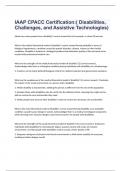
-
IAAP CPACC Certification:( Disabilities, Challenges, and Assistive Technologies) exam 2023 with 100% correct answers
- Exam (elaborations) • 13 pages • 2023
-
Available in package deal
-
- $16.49
- + learn more
About how many people have a disability? One in five people, or about 20 percent What is the medical theoretical model of disability? Viewing disability in terms of biological impairments; a problem caused by genetic disorders, disease, trauma or other health conditions. Disability is treated as a biological problem that diminishes quality of life and needs to be treated with professional medical care What are the strengths of the medical theoretical model of disability? (2) 1. ...
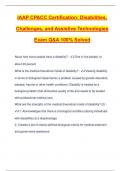
-
IAAP CPACC Certification: Disabilities, Challenges, and Assistive Technologies Exam Q&A 100% Solved
- Exam (elaborations) • 23 pages • 2024
-
- $9.99
- + learn more
IAAP CPACC Certification: Disabilities, Challenges, and Assistive Technologies Exam Q&A 100% Solved About how many people have a disability? - One in five people, or about 20 percent What is the medical theoretical model of disability? - Viewing disability in terms of biological impairments; a problem caused by genetic disorders, disease, trauma or other health conditions. Disability is treated as a biological problem that diminishes quality of life and needs to be treated with professi...
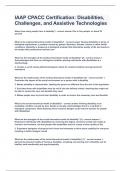
-
IAAP CPACC Certification: Disabilities, Challenges, and Assistive Technologies|2023 LATEST UPDATE|GUARANTEED SUCCESS
- Exam (elaborations) • 13 pages • 2023
-
Available in package deal
-
- $15.49
- + learn more
About how many people have a disability? One in five people, or about 20 percent What is the medical theoretical model of disability? Viewing disability in terms of biological impairments; a problem caused by genetic disorders, disease, trauma or other health conditions. Disability is treated as a biological problem that diminishes quality of life and needs to be treated with professional medical care What are the strengths of the medical theoretical model of disability? (2) 1...
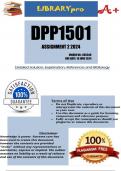
-
DPP1501 Assignment 2 due 10 June 2024
- Exam (elaborations) • 28 pages • 2023
-
- $2.71
- 1x sold
- + learn more
DPP1501 Assignment 2 2024 (605540) - DUE 10 June 2024 ;100 % TRUSTED workings, explanations and solutions. For assistance call or W.h.a.t.s.a.p.p us on ...(.+.2.5.4.7.7.9.5.4.0.1.3.2)........... Question 1 THEME: INFUSE AFRICAN EPISTEMOLOGIES AND PHILOSOPHIES WITHIN THE PQM 1.1 Read the following scenario in order to answer the questions that follow. Various options are provided in the box below the scenario, to help you answer the questions. Please choose the relevant answers to the question...
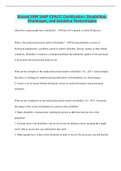
-
Shared DNR IAAP CPACC Certification: Disabilities, Challenges, and Assistive Technologies |80 Questions with 100% Correct Answers | Verified | Latest Update
- Exam (elaborations) • 15 pages • 2023
- Available in package deal
-
- $13.49
- + learn more
About how many people have a disability? - One in five people, or about 20 percent What is the medical theoretical model of disability? - Viewing disability in terms of biological impairments; a problem caused by genetic disorders, disease, trauma or other health conditions. Disability is treated as a biological problem that diminishes quality of life and needs to be treated with professional medical care What are the strengths of the medical theoretical model of disability? (2) - 1. Acknow...
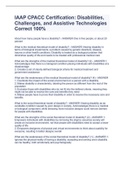
-
IAAP CPACC Certification: Disabilities, Challenges, and Assistive Technologies Correct 100%
- Exam (elaborations) • 11 pages • 2023
-
- $11.99
- + learn more
About how many people have a disability? - ANSWER One in five people, or about 20 percent What is the medical theoretical model of disability? - ANSWER Viewing disability in terms of biological impairments; a problem caused by genetic disorders, disease, trauma or other health conditions. Disability is treated as a biological problem that diminishes quality of life and needs to be treated with professional medical care What are the strengths of the medical theoretical model of disability? ...
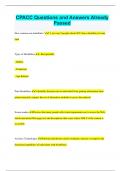
-
CPACC Questions and Answers Already Passed
- Exam (elaborations) • 94 pages • 2024
-
Available in package deal
-
- $11.99
- + learn more
CPACC Questions and Answers Already Passed How common are disabilities? ~1 in every 5 people (about 20%) has a disability of some kind Types of Disabilities - Recognizable - Hidden - Temporary - Age-Related Print Disabilities a disability that prevents an individual from gaining information from printed material; requires the use of alternative methods to access the material Screen readers Devices that many people with visual impairments use to access the Web, which read a...
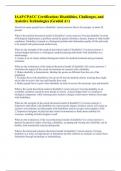
-
IAAP CPACC Certification: Disabilities, Challenges, and Assistive Technologies (Graded A+)
- Exam (elaborations) • 11 pages • 2023
-
- $10.99
- + learn more
About how many people have a disability? correct answers One in five people, or about 20 percent What is the medical theoretical model of disability? correct answers Viewing disability in terms of biological impairments; a problem caused by genetic disorders, disease, trauma or other health conditions. Disability is treated as a biological problem that diminishes quality of life and needs to be treated with professional medical care What are the strengths of the medical theoretical model o...
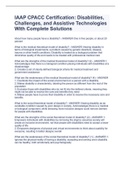
-
IAAP CPACC Certification: Disabilities, Challenges, and Assistive Technologies With Complete Solutions
- Exam (elaborations) • 11 pages • 2023
-
- $11.99
- + learn more
About how many people have a disability? - ANSWER One in five people, or about 20 percent What is the medical theoretical model of disability? - ANSWER Viewing disability in terms of biological impairments; a problem caused by genetic disorders, disease, trauma or other health conditions. Disability is treated as a biological problem that diminishes quality of life and needs to be treated with professional medical care What are the strengths of the medical theoretical model of disability? ...

Did you know that on average a seller on Stuvia earns $82 per month selling study resources? Hmm, hint, hint. Discover all about earning on Stuvia


